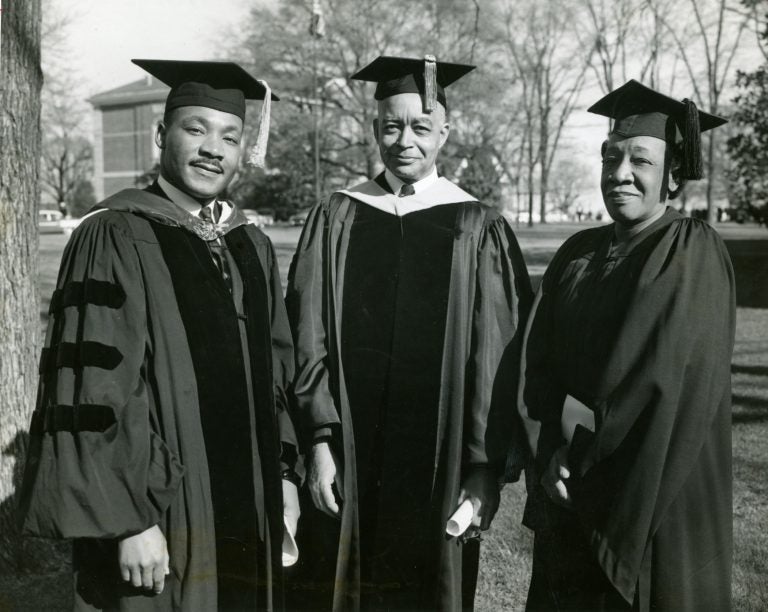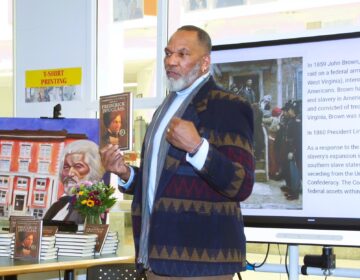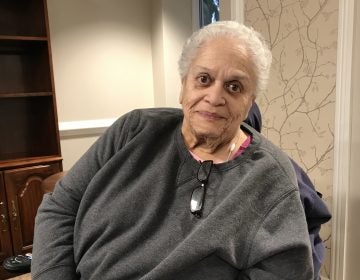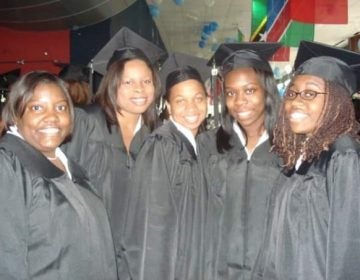The power of an educated mind, according to Dr. King
“Education helps to lift an individual from the bondage of legends and half truths to the unfettered realm of objective analysis," Dr. King said.

Dr. Martin Luther King Jr., (left) poses with Spelman President Albert Manley and Spelman Alumna and mother of Dr. King, Alberta Williams King, on Founders Day at Spelman College, April 10, 1960. (Courtesy of the Spelman College Archives)
This essay is part of a series of reflections on Dr. Martin Luther King, Jr.’s lesser-known speech, “Keep Moving From This Mountain.” The April 10, 1960, address to students at Spelman College will be the focus of a Community Conversation at WHYY on Friday, Jan. 17, from 6 – 8 p.m. Click here to RSVP.
The biblical story of God using Moses to lead his people out of bondage in Egypt is the foundation of Dr. King’s 1960 speech, “Keep Moving From This Mountain.”
The springtime address at Spelman College’s Founders’ Day outlined three distinct attitudes that emerged in the wilderness.
One group was wholly dissatisfied with the conditions in the wilderness and sought to return to Egypt, despite the injustices there.
The second bunch was those who refused to embrace any change, whether it meant going backward or forward. They were a cohort satisfied with indecisiveness, even at the risk of stagnancy.
Dr. King described the third group as individuals who were willing to suffer in order to reach the Promised Land. These were the free thinkers, who used imagination and creativity to see past their current circumstances.
Of the three groups, the Christian minister was concerned mainly with “the individuals who didn’t want to go back to Egypt necessarily and yet didn’t want to go on to the Promised Land, the individuals who chose the line of least resistance.”
It was this second group that possessed the most dangerous character flaw: a commitment to a life that minimizes suffering and maximizes comfort, at the cost of freedom.
In his speech, Dr. King dealt with four symbolic mountains: moral relativism, materialism, segregation and violence. He argued that failing to move away from these mountains would earn society a mindset of indecision and complacency.
I believe the most damning mountain presented in the speech is that of moral and ethical relativism, which assumes a belief is valid if the majority supports it.
Dr. King rightly viewed moral relativism as a threat to equality. The white majority’s assumption on Black inferiority wasn’t valid just because it was popular.
But the brilliance of the civil rights movement was that it promoted original thought and critical thinking, and also sought to change the hearts and minds of its detractors. According to Dr. King, moral and ethical relativism could be mitigated only through critical thinking.
“On the one hand education must give us the power to concentrate, the faculty for intensive thinking; this is a basic function of education,” Dr. King told the women of Spelman College. “On the other hand, education must help us to think critically. And so education helps to lift an individual from the bondage of legends and half-truths to the unfettered realm of objective analysis and creative appraisal.”
According to Aristotle, it is the mark of an educated mind to be able to entertain a thought without accepting it. Like the Greek philosopher, Dr. King knew that an educated mind would prevent people from accepting beliefs and traditions without questioning them.
Relativism focuses on the life experiences that shape a person’s moral values and justifies those beliefs through the lessons of those experiences. However, critics of relativism, like Dr. King, believe that establishing an incontrovertible right and wrong is the duty of society and is necessary for fair governance.
Dr. King’s speech inspires me to look inward and address (the wilderness in my life) the parts of myself that reject change.
Any decision that forces me out of my comfort zone is a wilderness with mountains that I must move on from.
Moral and ethical relativism is a mindset, a way of thinking, and a disease of uninvestigated morals and values that keep the people of this nation from moving forward.
And to truly move forward, to fully progress, one must first change their mind.
Alexis Roberson is a recent graduate of Spelman College with a B.S. degree in Computer Science. She currently works at Comcast as an engineer on the product development team.
WHYY is your source for fact-based, in-depth journalism and information. As a nonprofit organization, we rely on financial support from readers like you. Please give today.




